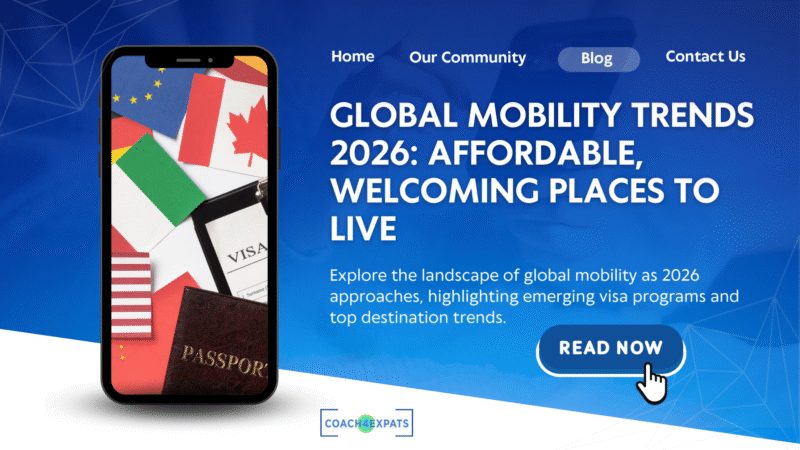Expat or Digital Nomad? Key Differences to Know Before Moving Abroad in 2026

Confused between becoming a digital nomad or an expat in 2026? Discover the key differences in lifestyle, visas, careers, and community, and find out which path aligns with your dream life abroad.
Today, more than 40 million people worldwide identify as digital nomads, while millions of others continue to thrive as traditional expats. Both paths are reshaping what it means to live and work abroad, but they’re not the same journey. Digital nomads move from country to country every few months, blending work with adventure. Expats, on the other hand, tend to settle for the long haul, weaving themselves into the social, professional, and cultural fabric of their new home.
And here’s the truth: neither choice is better, but one may be better for you. That’s why understanding the key differences between digital nomads and expats in 2026 is more than a curiosity, it’s the first step toward creating the lifestyle that truly matches your vision, your values, and your future.
In this article Coach4expats will walk you through:
– The core definitions of expat and digital nomad lifestyles.
– How their intentions, duration, and visa requirements differ.
– The real impact on taxes, careers, and family life.
– Why new trends like “slomads” are emerging as a middle ground.
– And most importantly, how you can decide which path aligns with your dreams.
Because at the heart of it, this isn’t just about visas or job titles. It’s about asking: What kind of life do I want to live abroad?

What do these labels really mean in 2026?
Let’s start by clearing the fog: digital nomad and expat are not interchangeable. In 2026, these words carry very different meanings and choosing between them is less about labels, and more about how you want to experience life abroad.
The Digital Nomad Life
Digital nomads are remote professionals who use technology to work from anywhere in the world. They’re the ultimate free spirits of the workforce, designing websites from Lisbon, running marketing campaigns from Medellín, or coding apps from Bali. Most move every 1–6 months, with a growing number embracing the “slomad” trend: slowing down, staying 2–3 months in one spot to create balance and avoid travel burnout.
Governments have caught up with this lifestyle too. By 2025, 73 countries were offering digital nomad visas, allowing stays of 6–24 months. These visas usually require proof of remote income (anywhere from €1,500 to €3,500 monthly) and often come with attractive tax perks. The one catch? They’re built for remote work abroad, not local employment. You can bring your job with you, but you can’t take one in your host country.
The Expat Life
Expats, on the other hand, are in it for the long game. They’re professionals, families, or retirees who relocate abroad with the intention of establishing roots. Unlike digital nomads, expats usually invest in housing, send their kids to local or international schools, and pursue permanent residency or even citizenship.
Their visas follow more traditional pathways: work permits, family reunification visas, retirement visas, or investment visas. These often open the door to permanent residency after just a few years. And from a lifestyle perspective, expats typically build deep networks, learning local languages, participating in cultural traditions, and creating stability that lasts decades, not months.
| Aspect | Digital Nomad | Expat |
| Lifestyle & Stability | Constant movement, adventure, and flexibility. Many move every 1–6 months, some slow down to 2–3 months per stop. | Routine, stability, and deeper connections. Often stay for years, sometimes decades. |
| Visas & Legal Status | Digital nomad visas (available in 73 countries as of 2025). Stays of 6–24 months. Remote income required (€1,500–€3,500/month). No local employment allowed. | Work permits tied to local jobs, family reunification visas, retirement or investment pathways. Often leads to permanent residency or citizenship after 3–5 years. |
| Career & Income | Freelancing, startups, remote contracts, gig-based work. Average earnings €58,000–€128,000 annually. | Corporate transfers, in-country jobs, or relocation packages. Often includes benefits like housing, healthcare, and schooling support. |
| Finances & Taxes | Complex, multi-jurisdiction obligations. Risk of double taxation. Some host countries (e.g., Albania, Costa Rica, Dubai) offer tax exemptions. | Establish clear tax residency in the host country (183+ days). Benefit from double taxation treaties. Easier for long-term tax planning and retirement. |
| Community & Belonging | Co-working spaces, co-living, online nomad groups, pop-up meetups. Global networks, but connections can be short-lived. | Expat clubs, local schools, and community ties. Greater cultural integration and long-term relationships. |
Trends that shape 2026
The world isn’t just open in 2026, it’s inviting you in. Both digital nomads and expats are benefiting from a wave of global changes that make moving abroad not only possible but also more rewarding than ever.
– The Rise of “Slowmads”
After years of constant movement, many digital nomads are choosing to slow down. Instead of hopping every few weeks, they’re staying 2–6 months in one destination. This allows for stronger community ties, reduced burnout, and a healthier work-life balance, somewhere between nomad freedom and expat stability.
– Governments competing for mobile talent
Countries around the globe are realizing the value of attracting remote workers and long-term expats. Expect more digital nomad visas with tax perks and streamlined residency pathways. Many nations now offer faster, digital-first applications that simplify the relocation process.
– Affordable new hubs
Traditional hotspots like Lisbon or Bali are facing rising costs. In 2026, new hubs are emerging across Latin America, Southeast Asia, and Eastern Europe, offering lower living expenses, strong expat communities, and excellent infrastructure for remote work.
– AI-Powered global careers
Thanks to AI-driven job platforms, location-independent careers have never been easier. Whether freelancing, consulting, or working remotely for companies worldwide, digital tools are helping professionals access opportunities across borders seamlessly.
Your next step in 2026: A practical guide
Every step you take is a step closer to the life you imagine. Whether you’re leaning toward the freedom of digital nomadism or the stability of expat life, success comes down to preparation. Here’s how to start:
1. Research your visa options
– Explore digital nomad visas if you want short-term flexibility.
– Look into work permits, family reunification, or retirement visas if you’re seeking stability and residency.
2. Understand taxes and healthcare
– Nomads: be aware of multi-jurisdiction tax rules and potential double taxation.
– Expats: learn about healthcare access and tax residency requirements in your host country.
3. Build networks before you arrive
– Join expat forums, digital nomad groups, and local community pages online.
– Early connections can smooth your landing and open professional doors.
4. Test-Drive the lifestyle
– Try a 3–6 month digital nomad stint to see how mobility feels before committing to a full relocation.
– Or spend a year abroad on an expat contract to explore if long-term settlement fits your vision.
Remember: you don’t need all the answers today. Just take one step! apply for that visa, book that flight, join that community. Your new life abroad begins with that single yes.








